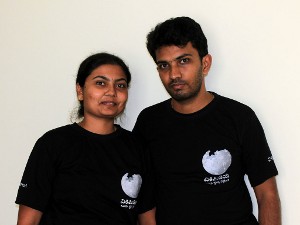Appearances can be deceiving, and in this particular case, they can make a very poignant statement. To illustrate the point of the “fast lane/slow lane”…
Posts tagged as “Internet”
On a Monday last October, Tennessee based publisher and writer Susan Linton decided her plate was too full and put the website Tux Machines up for sale. That Friday, October 28, she announced that she’d found a buyer in Roy Schestowitz, known in FOSS circles as the publisher of TechRights, a site which focuses on the political side of free tech.
For nine years, Tux Machines had been a place to read about Linux and FOSS, mainly from links to what others were writing on other sites. But it was also just a cool place to hang out and meet up with other Linux users. Certainly there were and are other sites doing almost the same thing — but Linton’s Tux Machines was different. It was kick-your-shoes-off-and-visit-a-spell homey. It was comfortable.

“I’m just getting too old and tired to keep the site up the way it and its loyal visitors deserve,” she wrote. “It may get better next spring, but this fall I’ll end up losing all my visitors I’m afraid.”
Christine Hall has been a journalist since 1971. In 2001, she began writing a weekly consumer computer column and started covering Linux and FOSS in 2002 after making the switch to GNU/Linux. Follow her on Twitter: @BrideOfLinux
eBay announced this morning that they’ve been hacked and that “encrypted passwords and other non-financial data” have been compromised. They’re expected to begin notifying their customer base later today, which will include a suggestion for users to change their passwords. The company says that PayPal, an eBay subsidiary, uses its own servers and was not affected by the attack.
According to CNET, the first public news of the compromise came by way of a cryptic blog posting by PayPal:
Christine Hall has been a journalist since 1971. In 2001, she began writing a weekly consumer computer column and started covering Linux and FOSS in 2002 after making the switch to GNU/Linux. Follow her on Twitter: @BrideOfLinux
Vachana sahitya is a form of rhythmic writing in Kannada poetry that evolved in the 11th century C.E. and flourished in the 12th century as a part of the Lingayatha movement. More than 259 Vachanakaras (Vachana writers) have compiled over 11,000 vachanas. 21,000 of these verses which were published in a 15 volume set, “Samagra Vachana Samputa,” by the Government of Karnataka, a state in South West India, have been digitized. Two Wikimedians along with Kannada linguist and author O. L. Nagabhushana Swamy are involved in the Unicode conversions, corrections and writing the preface for these verses. The entire work is now available as a standalone project called Vachana Sanchaya and ready to enrich Kannada WikiSource.

This project was started a year ago when Kannada Wikimedian Omshivaprakash was trying to help Professor O. L. Naghabhushana Swamy and Kannada author and publisher Vasudhendra to easily access the vachana (verses) of Vachana Sanchaya. Swamy had challenges in using publicly available content on Vachanas since the data was in ASCII and searching text was a huge problem. Pavithra Hanchagaiah started helping to collect information about about vachanas and document them into Unicode by writing scripts to customize open source software to convert the Kannada fonts from ASCII into Unicode.
The sharing feature of the Jetpack plugin for WordPress is currently being exploited for the purpose of sending spam and possibly for DDOS attacks. FOSS…
On Monday Ken Starks published an article on Internet access in his neck of the woods, which is outside the Austin city limits. That got me wondering how much most of you spend each month to have the ability to read articles on FOSS Force, watch the latest episodes of your favorite TV shows and check in with your friends on your favorite social network.
Here at FOSS Force we pay $35 monthly for a 4Mbs DSL connection with our local telephone company. Believe it or not, that serves us just fine. I suspect this is because we’re only about the third subscriber from the nearest switching station and we’re probably getting much higher speeds than advertised. All I know is that we can watch multiple movies and videos on multiple machines just fine, with no jerks or freezes. We certainly have more than enough speed for our normal work around here, which mainly consists of writing articles and posting them to the web, reading and sending email and spending way too much time avoiding work by playing on Facebook.
Christine Hall has been a journalist since 1971. In 2001, she began writing a weekly consumer computer column and started covering Linux and FOSS in 2002 after making the switch to GNU/Linux. Follow her on Twitter: @BrideOfLinux
There is more to open source than software, hardware and the Creative Commons. Open source can also be seen as a guide for living life that is based on principles that go back to antiquity. Openness and sharing aren’t only for computers, electronics and creative writing.
Jason Hibbets is working to convince local governments to adapt open source ideas in their day to day operations. His book, “The Foundation for an Open Source City,” attempts to be a step by step guide for implementing open source ideas into government policies and solutions, based on his own experiences. He uses Raleigh, North Carolina, where he resides, as his example. He calls it the worlds first open source city. In a way, the small southern capital is his laboratory.

Christine Hall has been a journalist since 1971. In 2001, she began writing a weekly consumer computer column and started covering Linux and FOSS in 2002 after making the switch to GNU/Linux. Follow her on Twitter: @BrideOfLinux





